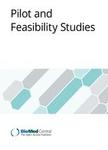版权所有:内蒙古大学图书馆 技术提供:维普资讯• 智图
内蒙古自治区呼和浩特市赛罕区大学西街235号 邮编: 010021

作者机构:McMaster University Department of Psychiatry Behavioural Neuroscience Hamilton ON Canada St. Joseph's Healthcare Hamilton Mood Disorders Research Unit Hamilton ON Canada McMaster University Department of Clinical Epidemiology and Biostatistics Hamilton ON Canada McMaster University Population Genomics Program Chanchlani Research Centre Hamilton ON Canada McMaster University Department of Medicine Hamilton ON Canada Centre for Evaluation of Medicine Hamilton ON Canada System-Linked Research Unit Hamilton ON Canada McMaster University Department of Anaesthesia Hamilton ON Canada McMaster University Department of Paediatrics Hamilton ON Canada
出 版 物:《Pilot and Feasibility Studies》 (Pilot Feasibility Stud.)
年 卷 期:2015年第1卷第1期
页 面:1-13页
主 题:Activation Adult Behavioural Depression Group Pilot Pragmatic Protocol Randomized Trial
摘 要:Background: Depression is a common disorder with a lifetime prevalence of 16 %. Despite the availability of several treatment options for depression, many patients do not respond to treatment and develop chronic illness associated with several secondary comorbidities. Behavioural activation (BA) is a simple therapy that has the potential for improving symptoms of depression and quality of life in patients with depression. The effectiveness of BA has not, however, been tested in a group format for patients with moderate to severe depression attending a specialized mood disorders tertiary care setting. Group format has the advantage of treating more patients at the same time especially in resource-limited settings. The primary objective of this pilot study is to test the feasibility of a main trial by assessing the recruitment and retention rates, average group size, completion of data and resources needed and receive the participants feedback on the intervention. The secondary objective is to explore the change in mood and quality of life measures in adults with depression receiving BA. Methods/Design: Using a pragmatic pilot randomized controlled trial design, we will test the feasibility of a large trial to assess the effectiveness of BA added to usual care compared to a depression support group with usual care. Participants will be randomized after obtaining informed written consent to one of two study arms. Face-to-face group therapy will be provided in a hospital setting by trained therapists. Intervention and control groups will be seen twice weekly for 10 weeks and then once weekly for further 8 weeks. Participants will be completing mood symptom scales, quality of life questionnaires and anthropometric measures and provide blood samples for future analysis of biomarkers of response to treatment. During the pilot study we will also solicit participants feedback and experience regarding the number, frequency and contents of the sessions as well as to explore